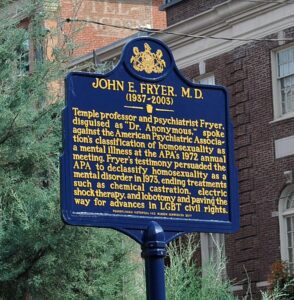Howard Fischer
Uppsala, Sweden
 |
|
Historical marker honoring John Fryer. Pennsylvania Historical and Museum Commission, 2017. Photo by NMGiovannucci on Wikimedia. CC BY-SA 4.0. |
“Any man more right than his neighbors constitutes a majority of one.”
– Henry David Thoreau
Homosexuality was defined as a psychiatric disorder in 1952, in the first edition of the Diagnostic and Statistical Manual (DSM) of the American Psychiatric Association (APA).1 Because homosexuals could be diagnosed as “mentally ill,” they could be hospitalized without their consent, denied employment, fired from their jobs, denied mortgages, and denied custody of their children after a divorce. They could not receive security clearance and were excluded from the military and the clergy.2-4 They were offered, or sometimes forced to undergo, “treatments” including electroconvulsive therapy (“shock treatments”) or lobotomy.5
In 1970 and 1971, gay activists protested the APA’s stance on homosexuality. At the 1972 APA annual meeting in Dallas, Texas, a panel discussion on homosexuality was to be held. On the panel were two homosexual men (who were not psychiatrists) and two male psychiatrists (who were not homosexual). What was missing was someone who was both.6
John Ercel Fryer, MD (1937–2003), was born in Kentucky, graduated from high school at age fifteen, and from college at nineteen. He earned his MD from Vanderbilt University in 1962 and began a psychiatry residency at the Menninger Foundation in Topeka, Kansas. The stress of having to hide his homosexuality in what he later called a “homophobic environment” was overwhelming. He left and started a residency at the University of Pennsylvania, but was dismissed because he was homosexual. He finally completed his psychiatric residency at a state hospital near Philadelphia.
John Fryer reluctantly agreed to speak on the panel at the Dallas meeting. If his identity were to become known, he would lose his faculty appointment at Temple University, so he went in disguise. He wore a curly wig, a stretched-out Richard Nixon mask, and a tuxedo three sizes too big with the belief that oversized clothes would make his six-foot, three-hundred-pound frame seem smaller.7 A microphone was modified to distort his voice. He was introduced as “Dr. Henry Anonymous.”
Fryer began: “I am a homosexual. I am a psychiatrist.” He went on to describe how homosexual psychiatrists had to hide their sexuality from colleagues (among others), for fear of discrimination. He criticized the current thinking of 90% of psychiatrists in 1970: “one cannot be healthy and homosexual, they would say.”8 At least one other member of the panel agreed that the APA’s approach must change, and an APA vice-president said,
“Psychiatry is prejudiced as has been charged.”9 It should be noted that in 1958 Alfred Kinsey and his co-researchers, after obtaining data from 5,300 men, noted that 37% of men had at least one homosexual experience and that 10% of American men were “more or less exclusively homosexual.”10
In 1973, the APA stopped listing homosexuality as a mental illness in the DSM. A “key factor” in this decision was Fryer’s speech.11 In 1990, the World Health Organization removed homosexuality as an illness from its International Classification of Diseases. Some countries then repealed laws criminalizing homosexuality and banned certain discriminations.12
In 1994, Dr. Fryer revealed that he was “Dr. Anonymous.” He is regarded as a pioneer in the struggle for gay rights. Memorial plaques, awards, and scholarships in his name honor him. Dr. Fryer became a professor of psychiatry at Temple University and spent much of his later career counseling patients with acquired immunodeficiency syndrome—AIDS. Despite his brave legacy, a recent survey of LGBT college students indicated that about half of them have not “come out” to their families or are not accepted by them, and that discrimination still produces anxiety and depression.13
References
- Jillian Eugenios. “‘I am a homosexual. I am a psychiatrist.’ How Dr. Anonymous changed history,” NBC News, May 2, 2022. https://nbcnews.com/nbc-out/out-news/-homosexual-psychiatrist-dr-anonymous-changed-history-rcna26836.
- Alix Spiegel. “81 words,” This American Life (broadcast), January 18, 2002. https://thisamericanlife.org/204/81-words/act-two-7.
- Ellen Barry. “He spurred a revolution in psychiatry,” New York Times, May 2, 2022.
- Eugenios, “I am.”
- Eugenios, “I am.”
- “John Fryer.” Wikipedia.
- Spiegel, “81 words.”
- Maggie Mancini. “50 years ago, Dr. John E. fryer shifted views on homosexuality in a bold speech to the APA,” Philly Voice, June 3, 2022.
- “John Fryer.” Wikipedia.
- “Kinsey reports.” Wikipedia.
- “John Fryer.” Wikipedia.
- Jack Drescher. “Out of DSM: Depathologizing homosexuality,” Behav Sci (Basel), 5(4), 2015.
- Robert DiGiacoma. “Intolerance weighs heavily on the mental health of LGBTQ+ community,” Everyday Health, July 25, 2022. https://everydayhealth.com/emotional-health/intolerance-weighs-heavily-on-the-mental-health-of-the-lgbtq-community/.
HOWARD FISCHER, M.D., was a professor of pediatrics at Wayne State University School of Medicine, Detroit, Michigan
Spring 2023 | Sections | Psychiatry & Psychology

Leave a Reply